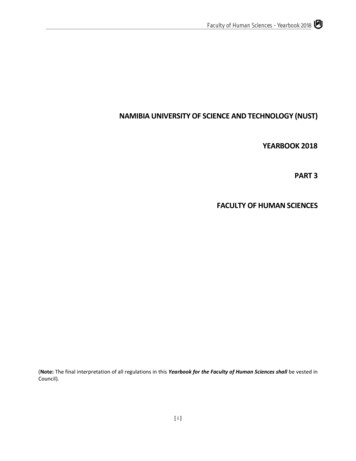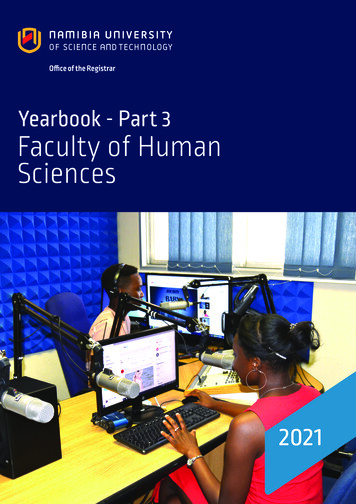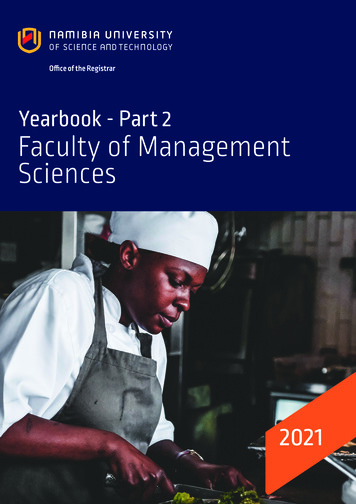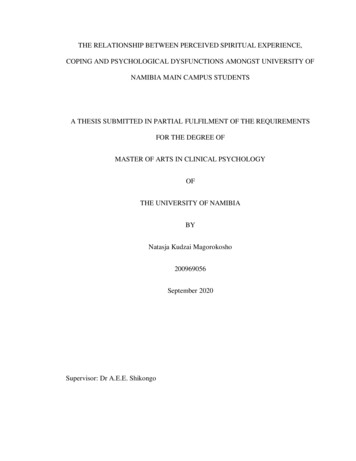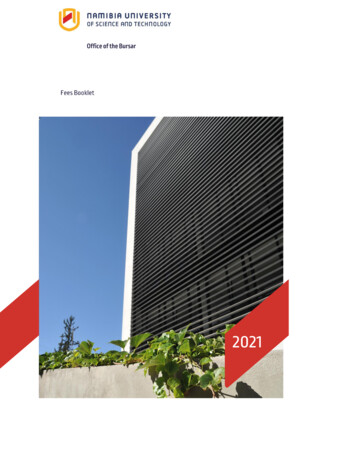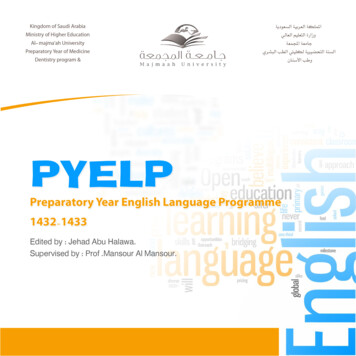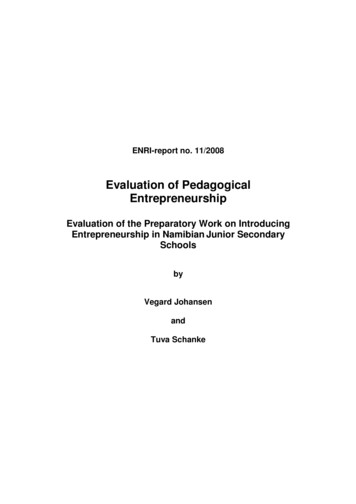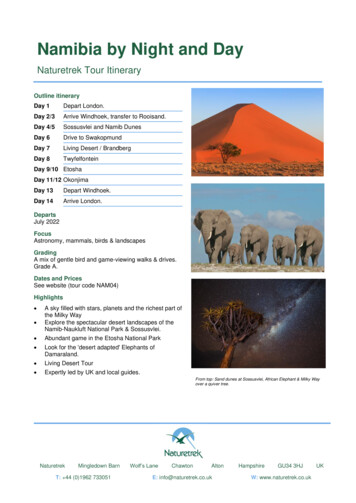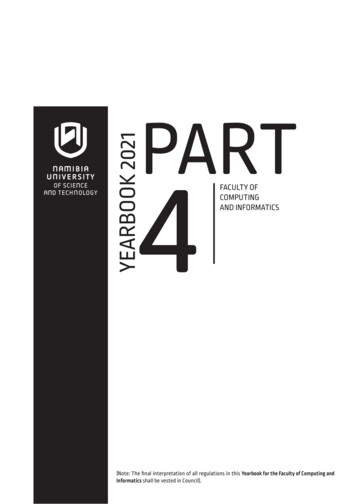
Transcription
YEARBOOK 2021PART4FACULTY OFCOMPUTINGAND INFORMATICS(Note: The final interpretation of all regulations in this Yearbook for the Faculty of Computing andInformatics shall be vested in Council).
Faculty of Computing and Informatics - Yearbook 2021NOTEThe Yearbook for the Faculty of Computing and Informatics is valid for 2021 only. Curricula and syllabi may be amended for 2022.It is obtainable free of charge from:The RegistrarNamibia University of Science and Technology (NUST)Private Bag 13388WindhoekNAMIBIALocation:13 Jackson Kaujeua Street, WindhoekTelephone:( 264-61) 207 2008 / 2118Fax:( 264-61) 207 hough the information contained in this Yearbook has been compiled as accurately as possible, Council and Senate accept no responsibilityfor any errors and omissions, which may occur. The University retains the right to amend regulations or conditions without prior notice.Due to the rapidly changing external environment that many programmes operate in, and the University’s desire to remain constantlyrelevant in its offerings, some programmes may be significantly amended after publication of this Yearbook. Please consult our website forthe latest versions of our curricula, syllabi and academic regulations.The fact that particulars of a specific programme, field of study, subject, or course have been included in this Yearbook does not necessarilymean that such a programme, field of study, subject, or course will be offered in the academic year 2021. Namibia University of Science and Technology/Office of the Registrar.[ ii ]
Faculty of Computing and Informatics - Yearbook 2021CONTACT DETAILSCentral Administration and Lecturers’ OfficesPostal Address:Private Bag 13388, Windhoek, NAMIBIAStreet Address:13 Jackson Kaujeua Street, Windhoek, NAMIBIAStudent post to: Private Bag 13388, Windhoek, NAMIBIAWebsite: www.nust.naEmail: registrar@nust.naCENTRE FOR OPEN AND LIFELONG LEARNINGPostal Address:Private Bag 13388, Windhoek, NAMIBIAStreet Address:13 Jackson Kaujeua Street, Windhoek, NAMIBIATel:207 2081/2206Fax:207 2208Website: www.nust.na/collE-mail: coll@nust.naTELEPHONE NUMBERSNUST Switchboard Operator:207 9111Office of the Vice Chancellor:Vice ChancellorDeputy Vice Chancellor: Administration and FinanceDeputy Vice Chancellor: Academic AffairsDeputy Vice Chancellor: Research and Innovation207 2000 / 1 - 3207 2004 / 5207 2280 / 1207 2181Office of the Registrar:RegistrarAssistant Registrar: Academic AdministrationExaminations OfficeStudent Enquiries, Registrations and Records207 2008 / 2118207 2351 / 2667207 2027 / 2412207 2056Office of the Bursar:Bursar207 2066Department of Student Services:DirectorStudents CouncillorCultural DepartmentSports Department207 2165207 2270207 2070207 2298Students Representative Council:Information & Communications Technology:DirectorLibrary & Information Services:Library, Enquiries and Loan CounterHostels:Men: Shangri-LaSuperintendentHouse CommitteeCall Office207 2457207 2275207 2022 / 2621207 2132207 2375229413 / 233130Ladies: Mon ResaSuperintendentHouse CommitteeCall Office207 2131207 2127229405 / 234193 / 233100Ladies: HöpkerSuperintendentHouse Committee207 2131207 2130NB: The international code in all numbers is 264-61[ iii ]
Faculty of Computing and Informatics - Yearbook 2021CONTENTSFACULTY OF COMPUTING AND INFORMATICSFACULTY CODE 1PageNote.iiContact Details.iiiContents.ivStaff.1UNDERGRADUAT PROGRAMMESDepartment of Computer Science. 4CERTIFICATE IN ADVANCED WEB TECHNOLOGIES.5CERTIFICATE IN BIG DATA TECHNOLOGIES.6CERTIFICATE IN ETHICAL HACKING AND INFORMATION SECURITY. 7Bachelor of Computer Science (Systems Administration, Communication Networks or Software Development)(Phasing out from 2020).8Bachelor of Computer Science (Systems Administration, Communication Networks or Software Development)(Revised; Phased in 2020). 11Bachelor of Computer Science (Cyber Security (Phasing out from 2021).15Bachelor of Computer Science (Cyber Security (Phasing in 2021). 18Department of Informatics. 22Bachelor of Informatics (Phasing out from 2020). 22Bachelor of Informatics (Revised; Phased in 2020). 24POSTGRADUATE PROGRAMMESDepartment of Computer Science.30Bachelor of Computer Science Honours (with specialisation in Communication Networks, Software Development,Mobile Development) (Phased out from 2020).30Bachelor of Computer Science Honours (with specialisation in Communication Networks, Software Development)(Revised; Phased in 2020).30Bachelor of Computer Science Honours (with specialisation in Digital Forensics, Information Security) Phasing out from 2021). 32Bachelor of Computer Science Honours (with specialisation in Digital Forensics, Information Security) Revised; Phasing in 2021). 32Master of Computer Science (with specialisations in Communication Networks, Software Development, Mobile Development, InformationSecurity or Digital Forensics) Phasing out from 2021. 34Master of Computer Science (with specialisations in Communication Networks, Software Development, Information Security or DigitalForensics) Revised; Phasing in 2021).36Doctor of Philosophy (PhD) in Computer Science (Phasing out from 2021).38Doctor of Philosophy (PhD) in Computer Science (Revised; Phasing in 2021) .40Department of Informatics.42Postgraduate Certificate in Information and Communication Technology Policy and Regulations.42Postgraduate Certificate in Informatics (Information Systems Audit) Phasing out from 2021.45Postgraduate Certificate in Informatics (Information Systems Audit) Revised; Phasing in 2021. 47Bachelor of Informatics Honours (with specialisation in Web Informatics or Business Informatics) (Phased out 2020).49Bachelor of Informatics Honours (with specialisation in Web Informatics or Business Informatics) (Phased in 2020).51Master of Informatics Phasing out from 2021).54Master of Informatics (Revised; Phasing in 2021).55Doctor of Philosophy (PhD) in Informatics (Phasing out 2021).56Doctor of Philosophy (PhD) in Informatics (Revised) (Phasing in 2021). 57[ iv ]
Faculty of Computing and Informatics - Yearbook 2021FACULTY OF COMPUTING AND INFORMATICSOFFICE OF THE DEANActing Dean:Associate Dean::Research and InnovationAssociate Dean::Teaching and LearningFaculty Officer:Telephone Number:Fax Number:Email Address:Secretary:Telephone Number:Email Address:PC Support Officer:Lab Technician:DEPRATMENT OF COMPUTER SCIENCEHead of Department:Deputy Head of Department:(Software Development Track)Deputy Head of Department:(Systems Adm and Networking Tracks)Secretary:Telephone Number:Email:Academic Staff::::::::::::::::::::FACULTY CODE 1Dr Colin Stanley, PhD. Comp. Sci. (UCT), M.Sc: Comp. Sci. (UNIBZ, Italy), B.Tech Hons.: SoftwareDevelopment (PoN), National Diploma Software Engineering (PoN)Prof Fungai Bhunu Shava, PhD: IT (NMU), M.Sc: Sci. (UZ), B.Sc.: Comp. Sci. & Maths. (UZ)Dr Munyaradzi Maravanyika, PhD. Informatics (NUST), M.Sc. (MSU, Zim), B.Sc.:Edu. & Comp. Sci(Bindura Uni. of Sc.Edu.), (Dip in Ed, UZ)Julia Semi, PG Dip: Business Admin (UNAM), BBA (UNAM), ND.: Commerce (PoN)061-207 2923061-207 9923jsemi@nust.naJesaria Khom-Oabes, Bachelor of Office Management and Technology (PoN)061 207 2258khom-oabes@nust.na061 207 2084061 207 2084Prof Guy-Alain Zodi Lusilao, PhD. Elec. Eng. (UCT), M.Sc.: Comp. Sci. (US), PG Dip: Math. Sc. (AIMS-SA),B.Sc. Hons.: Computing & Maths. Cum Laude (Univ. Kinshasa)Gereon Koch-Kapuire, M.Sc.: Comp. Sci. (UCT). B.Tech.: Bus. Comp. (PoN), ND: Bus. Comp. (PoN)Loini Iiyambo, M.Sc.: Electrical Engineering (UCT), B.Sc.: Comp. Sci. Honours (UJ) B.Sc. Comp. Sci & IT(UNAM), PGD: Advanced Comp. (CDAC, India)Rachel Amundaba, B.: Log.Hons. (NUST), B.Tech.: Business Admin (PoN), Dip.: Com.061- 207-2052ramundaba@nust.naProf Heike Winschiers-Theophilus, Dr. rer. nat. (Hamburg), Dip.-Inf. (Hamburg)Prof Dharm Singh Jat, PhD: Comp. Sci. & Eng. (MLSU, India), ME: Comp. Sci. & Eng. (India)Prof Hippolyte N Muyingi, PhD: Power Electronics, Cum Laude (VUB, Brussels), M.Sc.: Elec. Eng. CumLaude (UNAZA), B.Sc.: Elec. Eng. (UNAZA, DR Congo)Prof Jurgen Sieck, PhD: Applied Maths. (Humboldt, Germany)Prof Jose Quenum, PhD: Comp. Sci. (UPMC), M.Sc.: Comp. Sci. (UPD, Paris), Maitrise Hons. (UPD,Paris), B.Sc.: Comp. Sci. (UND, Bénin)Dr Attlee Gamundani, PhD: Comp. Sci. (NUST), M.Sc.: Comp. Sci. (UZ), B.Sc. Hons.: InformationSystems (Midlands State University)Dr Mercy Bere-Chitauro, PhD. Comp. Sci. (NUST),MIT, (Comp. Net.), B.Sc.: Comp. Sci. & Math. (UZ),CCNA, CCNP (R S), CCNA Instr. Linux, Comp. Sci. & Math. (UZ), CCNP, CCNP (R S), CCNA Instr. Linux,PGCHE (NUST)Dr Lameck Amugongo, M.Sc.: Comp. Sci. (NUST), B.IT Honours (Software Engineering), B.IT SoftwareEngineering (PoN), PhD. Cancer Science, University of ManchesterAlbertina Shilongo, M. Informatics (NUST), PGD: Big Data Analytics, CDAC, India), (B.IT Hons.: Comp.Netw. (PoN)Himeezembi Kahorongo, M.Sc.: Comp. Sci. (UNO), B.Tech.: Bus. Comp. (PoN/German,HochschulFlensburg)Isaac Nhamu, M.Sc.: Comp. Sci. (National University of Science and Technology), B.Sc.: Comp. Sci.(Univ. of Zimbabwe), Dipl.: TVET (Gweru Technical College), MCP (Microsoft Certified Professional– SQL Server)Jovita N. Mateus, M.Sc.: Comp. Sci. (NUST), B. Comp. Sci. Hons.: Comm. Netw. (NUST), B.IT: Syst.Admin. & Netw. (PoN)Julius Silaa, M. IT.: Comm. Netw. (NUST), B. Engineering and Technology (Info. & Comp. Sci.), MoscowPower Engineering Institute, CCNA Instructor, PGCHEPeter Gallert, M.A. Logic, Media Sci. (Leipzig), CCAIShadreck Chitauro, M.Sc.: Comp. Sci. (NUST), BIT. Hons.: Comp. Net. (PoN), B.Sc.: Comp. Sci. & Math.(UZ), CCNA, CCNP (R S), CCNA Instr, MCSA, MCP, LinuxShilumbe Chivuno-Kuria, MIT: Softw. Dev. (PoN), B.Sc.: Comp. Sci./Psych. (UNAM)Simon H. Muchinenyika, MIT (PoN), B.Sc. Hons.: Comp. Sci. (MSU)Steven Tjiraso, MTech (Computer Science), Jawaharial Nehru Tech University, India.BIT (SoftwareEngineering), (PoN)Edward Nepolo, M.Sc.: Comp. Sci. (NUST). B. Comp. Sci. Hons.: Comm. Network. (NUST), B.IT: SystAdmin & Netw.(PoN) PGD: IT Infrastructure, Systems and SecurityHerman Kandjimi, M.Sc.: Comp. Sci. (NUST), B. Comp. Sci. Hons.: Softw. Dev. (NUST), B.Sc.: Comp. Sci.[1]
Faculty of Computing and Informatics - Yearbook 2021& Applied Maths. (UCT)Ndinelago T Nashandi, M.Sc.: Comp. Sci. (NUST), B.Tech. Hons.: Info Sys (Russia), PGCHE (NUST)Rosetha Kays, M.Sc.: Comp. Sci. (NUST), B. IT. (NUST), B. Comp. Sci. Hons.: Software Dev. (NUST)PGCHE (NUST): Teresia Ankome, M.Sc.: Comp. Sci. (NUST),B. Comp. Sci. Hons.: Comm. Network (NUST), B.IT: SystAdmin. & Netw. (PoN): Shoopala Nambahu, PG-Diploma in High Performance Computing Systems Administration, (CDAC,India), B. Comp. Sci. Hons.: Comm. Network. (NUST), B.IT.: Syst. Admin. & Netw. (PoN),CCNA, MCSE, MCTS, MCITP: Nasimane Ekandjo, B.IT Hons.: Comp. Netw. (PoN), B.IT Systems Admin. & Netw. (PoN): Uakomba Mbasuva, M.Sc: Comp. Sci. (NUST), B. Comp. Sci. Hons.: Info. Security (NUST), B.IT.: SystemsAdmin. & Networks (NUST), CCNA1 InstructorDEPARTMENT OF INFORMATICSCode 23Head of Department: Dr Suama Hamunyela, PhD Informatics (NUST), M.Tech. IT (CPUT), B.Tech.: Business Comp. (PoN),ND: Bus. Comp. (PoN)Deputy Head of Department: Johnson Billawer, M.Sc.: Business Info. Systems (Aus.), B.Tech.: Bus. Comp. (PoN), ND: Bus.Comp. (PoN), SAP ERP Certified AssociateSecretary: Shivute Hilya, B.: Office Management & Technology (PoN)Telephone Number: 061- 207-2481Email: hshivute@nust.naAcademic Staff: Dr Samuel Akinsola, D.Tech. BIS (TUT), M.Tech. BIS (TUT), B.Tech. Hons.: Comp. Sci.(Nigeria): Dr Gloria E. Iyawa, PhD Info Sys (UNISA), M Sc Comp (UNISA), B.Sc. Hons.: Comp. Sci. & IT. (UNAM): Dr Jude Osakwe, PhD: Informatics (NUST), M.Sc.: IT (Nigeria), PGD Science Education (UAM), B.Sc.Hons.: Stat (UNIZIK): Dr Edmore Chikohora, PhD: Comp. Sc. (NWU), M.Sc.: Comp. Sci. (NUST, Zimbabwe),B.Sc.: Math. &Comp. Sci. with Ed. (Cuba), SAP ERP Certified Associate: Dr Irja Shaanika, PhD: Informatics (CPUT), M.: Informatics (NUST), PGCHE (NUST), B. IT Hons.: BusComp. (PoN), B. IT Bus Comp (PoN): Admire Kachepa, M.Sc.: Applied Math. & Comp. Sci. (RUDN University, Russia), B.Sc.: Applied Math.& Comp. Sci. (RUDN University, Russia): Gabriel Nhinda, MSc Business Informatics (Mannheim), BIT: Syst. Admin and Netw (PoN), ND:Information Technology (PoN): Paduri Veerabhadram, MCA, Comp. Sci. (Osmaria University, India, B Science: Mathematics(Kakatia University, India), PGCHE (NUST): Sinte Mutelo, M. Informatics (NUST), B. Informatics Hons. (NUST), B.IT: Bus. Comp. (PoN), FD Edu:(UNAM), BETD (UNAM), PGCHE (NUST): Nkululeko Mthembo, M. Informatics (NUST), BBA, Comp. & Man. IS (Solusi). PGCHE (NUST)Teressa Chikohora, Msc Information Systems (National University of Science and Technology,Zimbabwe), MEd Higher Education (Botho University, Botswana), BSc Hons Information Systems(Midlands State University, Zimbabwe): Katazo N. Amunkete, MSc Computing (UNISA), B. IT (Hons), Bus. Comp (PoN), B. IT: Systems Adminand Networks (PoN), ND. Info. Tech (PoN).Ruusa Ipinge, MSC Data Science for Business (Stirling University), BIT: Syst. Admin and Netw (PoN),B.A., Hons: Web Informatics (PON) PGC: Information System Audit (NUST): BETD: Mathematicsand Language (UNAM)Eliazer Mbaeva, MSc Computer Science [Trento]. PG Diploma in Advanced Computing (PG-DAC),Pune. B.IT.: Business Comp. (PoN).::CENTRE OF EXCELLENCE IN INFORMATION TECHNOLOGYCode 22Head of Centre: Arpit Jain, M.Tech in Information Technology (IETDAVV), B.Tech in Information Technology (RGPV),Certification: DB2, Lotus Domino, IBM TGMC MentorAcademic Staff: Charmaine Tjirare, Bachelor of Education (UNAM), Bachelor of English Honours (NUST)Dr Zeeshan Ahmed Khan, PhD: Comp. Sci. (KUC, India), M.Tech: Information Security (MANIT, India),Diploma: Project Management (CDAC, India), B.E: Computer Science (UIT, India)UNDERGRADUATE PROGRAMMESQUALIFICATIONS OFFEREDCertificate in Advanced Web TechnologiesCertificate in Big Data TechnologiesCertificate in Ethical Hacking and Information SecurityBachelor of Computer Science (Systems Administration, CommunicationNetworks or Software Development) (Phased out 2020)Bachelor of Computer Science (Systems Administration, Communication[2]CODES07CAWT07CBDT07CEHI07BACS
Faculty of Computing and Informatics - Yearbook 2021Networks or Software Development) (Revised - Phased in 2020)Bachelor of Computer Science in Cyber Security (Phasing out 2021)Bachelor of Computer Science in Cyber Security (Revised -Phasing in 2021)Bachelor of Informatics (Phasing out 2020)Bachelor of Informatics (Revised - Phased in uter Science and Informatics refer to the skills and knowledge needed to design applications and operate computer systems.Computer Science and Informatics studies at the Namibia University of Science and Technology offer different areas of specialisationsas well as different exit levels.Bachelor of Computer Science in Cyber Security: for those who successfully completed all requirements for the three-year degree of thephasing in (2016) programme.Bachelor of Computer Science (Systems Administration, Communication Networks or Software Development) or Bachelor of Informatics: forthose who successfully completed all requirements for the three-year degree of the phasing in (2020) programme.Certificate in Advanced Web Technologies, Certificate in Big Data Technologies and Certificate in Ethical Hacking and Information Security: forthose who successfully completed all requirements for the one semester certificate of the three CEIT programmes.Special Faculty Assessment RegulationsThere are situations where assessment of an individual course provided by other Faculties will supersede assessment regulations.This is reflected in the course documentation.Course Evaluation for all courses offered by the Faculty utilising in-course assessment and a Theory Paper and a Practical Paper An in-course mark is determined by continuous evaluation made up of tests and practicals during the semester. Students must have satisfactorily completed to the minimum standard (40% overall) all practicals and tests during the semester tobe admitted to the final examination. E.g. a class mark of 40%.Final Examination consists of two papers: Theory and Practical A sub-minimum of 40% must be obtained in each paper. The combined examination mark must be at least 50% overall. In-course mark and examination mark shall be used jointly to determine the final mark in the ratio of 50% (semester mark) to 50%(examination mark) or 60% (semester mark) to 40% (examination mark) or as specified in the course outline.Course Evaluation for all courses offered by the Faculty utilising in-course assessment and a Theory Paper An in-course mark is determined by continuous evaluation made up of tests and assignments during the semester. Students must have satisfactorily completed to the minimum standard (40% overall) all assignments and tests during the semesterto be admitted to the final examination.Final examination consists of one Theory Paper A sub-minimum of 40% must be obtained in the examination. In-course mark and examination mark shall be used jointly to determine the final mark in the ratio of 50% semester mark to 50%examination mark. In-course mark and examination mark shall be used jointly to determine the final mark in the ratio of 50% (semester mark) to 50%(examination mark) or 60% (semester mark) to 40% (examination mark) or as specified in the course outline.Course Evaluation for all courses offered by the Faculty using Continuous Evaluation only The semester mark is determined by continuous evaluation made up of a minimum of four assessments during the semester. The course mark is the final mark. Students must obtain a 50% mark to pass the course. Supplementary tests and extensions will be defined within the individual course outline.REMOTE TEACHING LEARNING AND ASSESSMENT (RTLA) The semester mark is determined by continuous evaluation made up of a minimum of four assessments during the semester the number of assessments for both existing continuous assessment courses and converted exam-based courses to continuousassessment courses are reduced from a minimum of four (4) assessments as per current regulation to three (3) assessments to ensurea consistent and equal number of assessments for all students; 50% of the weight of the assessments should be conducted under controlled conditions. 50% can be different assessments, for example: two tests, but it should be conducted under controlled conditions similar to thoseunder which the institutional examinations are conducted. Controlled conditions include the following: Timed tests on the MOODLE Platform; Structured questions that students anser on paper using a cam scanner and upload it after the test within 15 minutes; and/or Using software that block/restrict the use of any applications on a student’s device.[3]
Faculty of Computing and Informatics - Yearbook 2021NB: For all assessments, the Faculty plagiarism policy applies.[4]
Faculty of Computing and Informatics - Yearbook 2021DEPARTMENT OF COMPUTER SCIENCECode 22CENTRE OF EXCELLENCE IN INFORMATION TECHNOLOGY (CERTIFICATE PROGRAMMES)CERTIFICATE IN ADVANCED WEB TECHNOLOGIESNQF Level: 707CAWTNQF Credits: 60NQF Qualification ID: Q 2016DescriptionThe Certificate in Advanced Web Technologies provides students with an understanding of the emerging approaches in Web technologies.It seeks to equip students with the practical skills required to design and implement Web applications. The programme will further exposestudents to advanced concepts, tools and methods used to build Internet-based applications. The programme further aims to developstudent’s ability to communicate these insights to stakeholders within their respective organisations.Graduates of this programme will be able to find employment in both the public and private sectors, in roles that include, but are notlimited to lead developers in Software Development teams or designers. They can also team-up with other graduates and participate injoint venture.Admission RequirementsApplicants must have completed a Diploma programme at NQF level 6 in Computer Science, Information Systems, Information Technologyor Informatics or an equivalent qualification from an accredited institution. Applicants with one year experience in the afore-mentionedfields will be given priority.Applicants from other science and engineering disciplines or with prior learning experience may be admitted into this programme at thediscretion of the Centre. Such applicants may be required to write a test or an interview to guide the selection.Articulation ArrangementsTransfer of credits will be dealt with according to NUST regulations on Recognition of Prior Learning. This provides for course-by-coursecredits as well as credit transfer by volume under certain academic conditions. The maximum credit that can be granted is 50% of thetotal credits for the qualification.The Certificate is a programme with a single exit route, referred to as the professional route and as such, articulation arrangements areonly acceptable between programmes offered by the CEIT. The Certificate in Advanced Web Technologies will not lead to further academicstudy.Mode of DeliveryThe programme will be delivered on full-time (day and/or evening) in accordance with NUST rules. The e-learning platform, provided allrequirements for such delivery mode are met, will be part and parcel of the delivery mode to enhance course content reachability andadministration of assessments and student engagement.CURRICULUMYear 1Semester 1/2Course CodeCourse Title Prerequisites NQFLevelsCPC711S Computer Programming Concepts None 5WPG711S Web Programming 1 None 7DCS711S Database Concepts None 7WPG721S Web Programming 2 None 7JWT711S JavaScript-based Web Technologies None 7PRJ711S Project None 7[5]NQFCredits1088121012
Faculty of Computing and Informatics - Yearbook 2021CERTIFICATE IN BIG DATA TECHNOLOGIESNQF Level: 707CBDTNQF Credits: 62NQF Qualification ID: Q 2015DescriptionThe Certificate in Big Data Technologies (CBDT) provides students with an understanding of the emerging technologies that facilitate thestorage, processing, and analysis of big data. It seeks to equip students with the practical skills required to turn large volumes of data intoactionable insights. The programme exposes students to the design and building of platforms and systems that can handle the giganticamount of data available today. The programme further aims to develop students’ ability to communicate these insights to stakeholderswithin their respective organisations.Graduates of this programme will be able to find employment in both the public and private sectors, in roles that include, but are not limitedto, software development, data analytics, Dev-ops (a new job description at the frontier of software development and infrastructureoperations) and systems administration,Admission RequirementsApplicants must have completed a Diploma programme at NQF level 6 in Computer Science, Information Systems, Information Technologyor Informatics or an equivalent qualification from an accredited institution. Applicants with one-year experience in the afore-mentionedfields will be given priority.Applicants from other science and engineering disciplines or with prior learning experience may be admitted into this programme at thediscretion of the Centre. Such applicants may be required to write a test or an interview to guide the selection.Articulation ArrangementsTransfer of credits will be dealt with according to NUST regulations on Recognition of Prior Learning. This provides for course-by-coursecredits as well as credit transfer by volume under certain academic conditions. The maximum credit that can be granted is 50% of thetotal credits for the qualification.The Certificate is a programme with a single exit route, referred to as the professional route and as such, articulation arrangements areonly acceptable between programmes offered by the Centre. The Certificate in Big Data Technologies will not lead to further academicstudy. E.g. Honours or Masters. The Certificate in Big Data Technologies will not lead to further academic study.Mode of DeliveryThe programme will be delivered on full-time (day and/or evening) in accordance with NUST rules. The e-learning platform, provided allrequirements for such delivery mode are met, will be part and parcel of the delivery mode to enhance course content reachability andadministration of assessments and student engagement.CURRICULUMYear 1Semester 1/2Course CodeCourse Title Prerequisites NQFLevelsFLP711S Fundamentals of Linux Programming None 7JVP711S Java Programming None 7DCD711S Database Concepts & Data Collection None 7BDT711S Big Data Technologies None 7PRJ711S Project None 7[6]NQFCredits1010102012
Faculty of Computing and Informatics - Yearbook 2021CERTIFICATE IN ETHICAL HACKING AND INFORMATIO
Facult of Coputing and Inforatics Yearboo 2021 [ ii ] [ iii ] CONTACT DETAILS Central Administration and Lecturers' Offices Postal Address: Private Bag 13388, Windhoek, NAMIBIA Street Address: 13 Jackson Kaujeua Street, Windhoek, NAMIBIA Student post to: Private Bag 13388, Windhoek, NAMIBIA Website: www.nust.na Email: registrar@nust.na CENTRE FOR OPEN AND LIFELONG LEARNING
